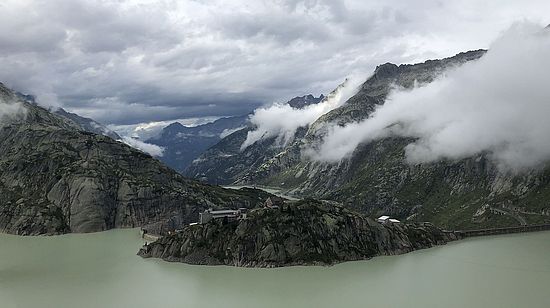
Foto: Alain Müller
Forschungsgruppe «Nature – Representations – Materialities»
Die Forschungsgruppe «Nature – Representations – Materialities» ist an den Schnittstellen von Wissensanthropologie, Umweltanthropologie und STS angesiedelt und umfasst momentan drei Projekte.
Auf den Spuren dessen, was der Anthropologe Philippe Descola als «Anthropologie der Natur» bezeichnet hat, verfolgt die Forschungsgruppe Projekt zwei Ziele.
Erstens nähern wir uns der Natur als einer historisch und lokal situierten Erfindung, deren Entstehung, situierten Folgen und Implikationen wir ethnographisch nachzeichnen und untersuchen. Dabei fokussieren wir verschiedene Praktiken mit ihren spezifischen «Wissensmodi» (technisch-wissenschaftlich, politisch, fiktional, ethnographisch) sowie deren Voraussetzungen und Verzweigungen, durch die die Natur dargestellt wird. Besondere Aufmerksamkeit kommt dabei der vermittelnden Rolle zu, die verschiedene Dinge, Entitäten, Körper und Geschichten in diesen Prozessen spielen.
Zweitens versuchen wir das, was als Natur verstanden wird, zu multiplizieren, zu brechen und neu zu artikulieren: Natur sowie die Wissenspraktiken, die darauf abzielen, sie zu begreifen, verstehen wir als Beziehungsgeflechte zwischen Entitäten und Wesen unterschiedlichster Art, einschliesslich der Menschen. Wie entstehen diese verschiedenen Akteure*, wie entfalten sie ihre Eigenschaften und ihre Beziehungen, ihre Fähigkeiten und ihre Gruppierungen (Latour 1993: 15) in situierter Praxis? Und wie können diese Naturenkulturen von der Anthropologie und Ethnographie, und von einem politischen Standpunkt aus neu artikuliert und dargestellt werden?
Diesen Fragen gehen die drei Projekte Re-presenting Mountains: Composing Nature between Mountain Reliefs, Comics, and Suiseki, Articulating Natures in Democracy, Governance, and Law und Berge erzählen nach.
The research group “Nature - Representations - Materialities” is at the intersections of the anthropology of knowledge, Science and Technology Studies, and environmental anthropology. Currently, it has three projects.
Following in the footsteps of Philippe Descola’s “anthropology of nature,” this research group project pursues two goals.
First, it approaches Nature as a historically and locally situated invention, whose emergence, consequences, and implications are examined and traced ethnographically. In particular, it focuses on various practices—technoscientific, political, fictional, and ethnographic—that aim to represent what counts as Nature. Each have their own specific knowledge regimes, as well as ontological presuppositions and ramifications. Here, our methodological stance pays particular attention to the mediation of different entities, things, bodies, and stories.
Second, the research project seeks to multiply, diffract, and rearticulate what is understood as Nature. It approaches and understands both Nature and the knowledge practices that aim to comprehend it as webs of relations between different entities and beings—humans included. How do these different actors and their relations, properties, abilities, and groupings emerge in situated practice? And how can these naturescultures be rearticulated and re-presented by anthropology, ethnography, and politics? These are questions that concern us.
The three projects Re-presenting Mountains: Composing Nature between Mountain Reliefs, Comics, and Suiseki, Articulating Natures in Democracy, Governance, and Law and Berge erzählen explore these questions.
Publikationen:
Müller, A. (2023) “Die multiplen Inszenierungen des Berges. Praktiken der Bergdarstellung und ihre ontologische Politik”., Schweizerisches Archiv für Volkskunde | Archives suisses des traditions populaires, 119(2), pp. 7–17. Available at: 10.33057/CHRONOS.1745/7-17.
Müller, A. (2022) “Der schmale Grat zwischen Realismus und Interpretation. Ein rekursiver Dialog zwischen ‘realistischem’ franko-belgischem Comic und Ethnographie”, Zeitschrift für Empirische Kulturwissenschaft, 118(1&2), pp. 51–77. Available at: 10.31244/zekw/2022.04. edoc | Open Access
Quick Links
